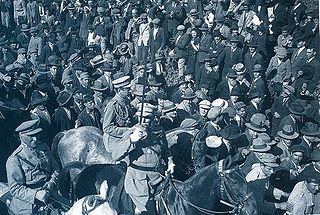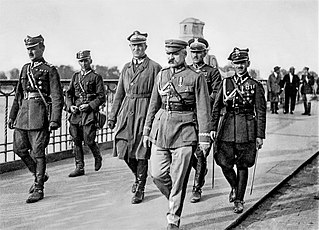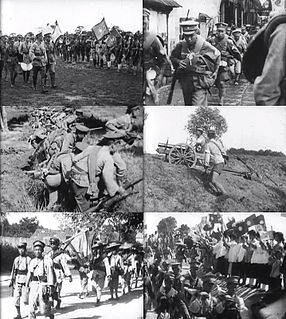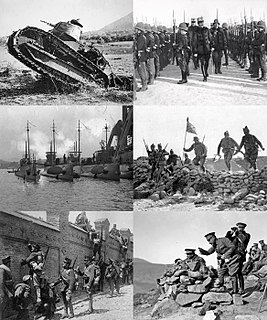 W
WThe 28 May 1926 coup d'état, sometimes called 28 May Revolution or, during the period of the authoritarian Estado Novo, the National Revolution, was a military coup of a nationalist origin, that put an end to the unstable Portuguese First Republic and initiated 48 years of authoritarian rule in Portugal. The regime that immediately resulted from the coup, the Ditadura Nacional, would be later refashioned into the Estado Novo, which in turn would last until the Carnation Revolution in 1974.
 W
WThe Anti-Fengtian War was the last major civil war within the Republic of China's northern Beiyang government prior to the Northern Expedition. It lasted from November 1925 to April 1926 and was waged by the Guominjun against the Fengtian clique and their Zhili clique allies. The war ended with the defeat of the Guominjun and the end of the provisional executive government. The war is also known as either Guominjun-Fengtian War, or the Third Zhili–Fengtian War.
 W
WThe Great Syrian Revolt or Great Druze Revolt (1925–1927) was a general uprising across Mandatory Syria and Lebanon aimed at getting rid of the French, who had been in control of the region since the end of World War I. The uprising was not centrally coordinated; rather, it was attempted by multiple factions – among them Sunni, Druze, Alawite, Christian, and Shia – with the common goal of ending French rule. The revolt was ultimately put down by French forces.
 W
WThe 1926 Lithuanian coup d'état was a military coup d'état in Lithuania that resulted in the replacement of the democratically elected government with a conservative authoritarian government led by Antanas Smetona. The coup took place on 17 December 1926 and was largely organized by the military; Smetona's role remains the subject of debate. The coup brought the Lithuanian Nationalist Union, the most conservative party at the time, to power. Before 1926, it had been a fairly new and insignificant nationalistic party: in 1926, its membership numbered about 2,000 and it had won only three seats in the parliamentary elections. The Lithuanian Christian Democratic Party, the largest party in the Seimas at the time, collaborated with the military and provided constitutional legitimacy to the coup, but did not accept any major posts in the new government and withdrew in May 1927. After the military handed power over to the civilian government, it ceased playing a direct role in political life.
 W
WThe May Coup was a coup d'état carried out in Poland by Marshal Józef Piłsudski between 12 and 14 May 1926. The coup overthrew the democratically elected government of President Stanisław Wojciechowski and Prime Minister Wincenty Witos. A new government was installed, headed by Lwów Polytechnic Professor Kazimierz Bartel. The events were partly inspired by the need for extraordinary measures in the face of newly emerging threats to the stability of Poland's independence by Piłsudski's own assessment of the foreign treaties signed by Weimar Germany with France in 1925 and with the Soviet Union in April 1926, to which Poland's representatives had not been invited.
 W
WThe Northern Expedition was a military campaign launched by the National Revolutionary Army (NRA) of the Kuomintang (KMT), also known as the "Chinese Nationalist Party", against the Beiyang government and other regional warlords in 1926. The purpose of the campaign was to reunify China, which had become fragmented in the aftermath of the Revolution of 1911. The expedition was led by Generalissimo Chiang Kai-shek, and was divided into two phases. The first phase ended in a 1927 political split between two factions of the KMT: the right-leaning Nanjing faction, led by Chiang, and the left-leaning faction in Wuhan, led by Wang Jingwei. The split was partially motivated by Chiang's purging of communists within the KMT, which marked the end of the First United Front. In an effort to mend this schism, Chiang Kai-shek stepped down as the commander of the NRA in August 1927, and went into exile in Japan.
 W
WThe Rif War was an armed conflict fought from 1920 to 1927 between the colonial power Spain and the Berber tribes of the Rif mountainous region of Morocco. Led by Abd el-Krim, the Riffians at first inflicted several defeats on the Spanish forces by using guerrilla tactics and captured European weapons. After France's military intervention against Abd el-Krim's forces and the major landing of Spanish troops at Al Hoceima, considered the first amphibious landing in history to involve the use of tanks and aircraft, Abd el-Krim surrendered to the French and was taken into exile.
 W
WThe epic of Ain Albu Gomaa, one of the military operations carried out by revolutionary groups in the city of Deir Ezzor in early June 1925 against the French forces during the Great Syrian Revolution.